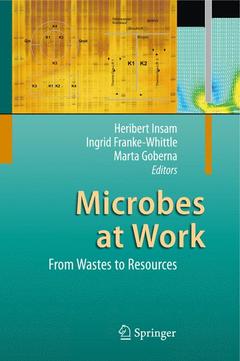Microbes at Work, 2010 From Wastes to Resources
Coordonnateurs : Insam Heribert, Franke-Whittle Ingrid, Goberna Marta

Among the goals of environmentally sound waste treatment is the recycling of organic wastes. The most practiced options are composting and anaerobic digestion, both processes being carried out by microorganisms. This book provides an overview of the various ways microbes are doing their job and gives the reader an impression of their potential.
The sixteen chapters of this book summarize the advantages and disadvantages of treatment processes, whether they are aerobic like composting or work without oxygen like anaerobic digestion for biogas (methane) production. These chapters show the potential of microorganisms to create valuable resources from otherwise wasted materials. These resources include profitable organic, humus-like soil conditioners or fertilizer components which are often suppressive to plant diseases. Composts may thus improve soil carbon sequestration, or support sustainable agriculture by reducing the need for mineral fertilizers or pesticides. If anaerobic digestion is used, the biogas produced may replace fossil fuels. Thus, proper biological waste treatment with the help of microorganisms should contribute to a reduction of anthropogenic greenhouse gas production.
The reader is informed about the state of the art of biological waste treatment and how to exploit the potential that microorganisms are offering for this purpose
Includes supplementary material: sn.pub/extras
Date de parution : 11-2014
Ouvrage de 329 p.
15.5x23.5 cm
Disponible chez l'éditeur (délai d'approvisionnement : 15 jours).
Prix indicatif 210,99 €
Ajouter au panierDate de parution : 12-2009
Ouvrage de 329 p.
15.5x23.5 cm



